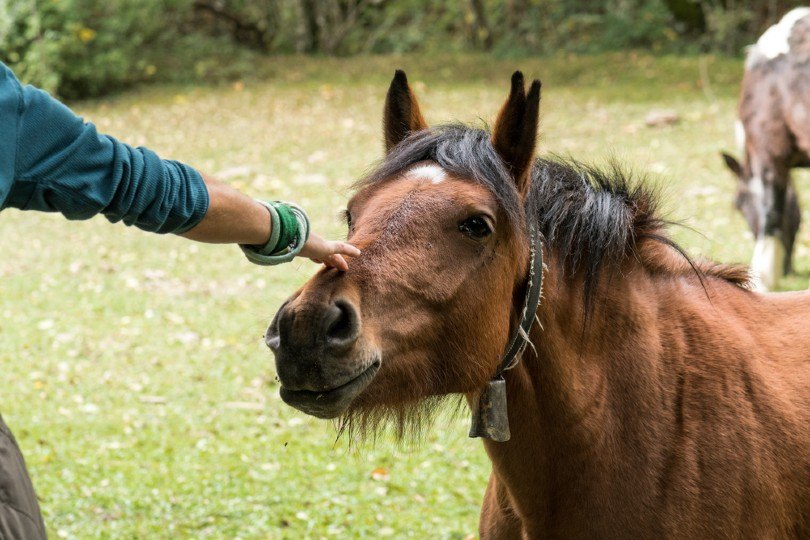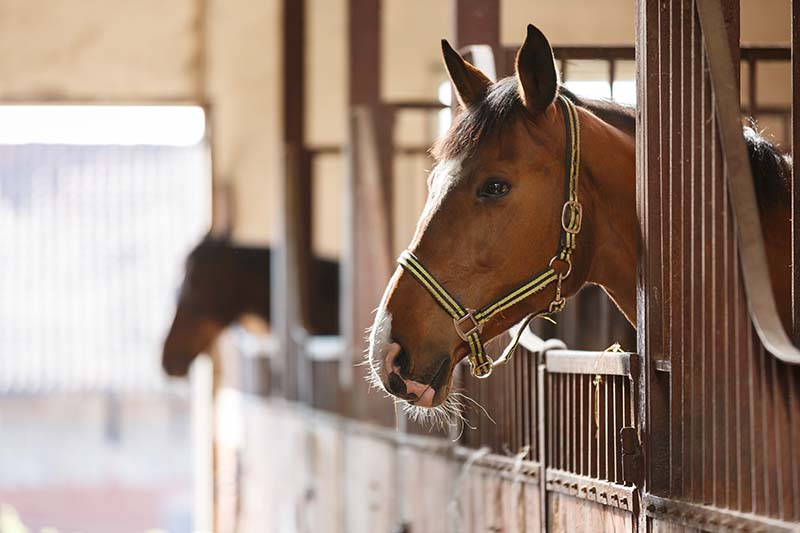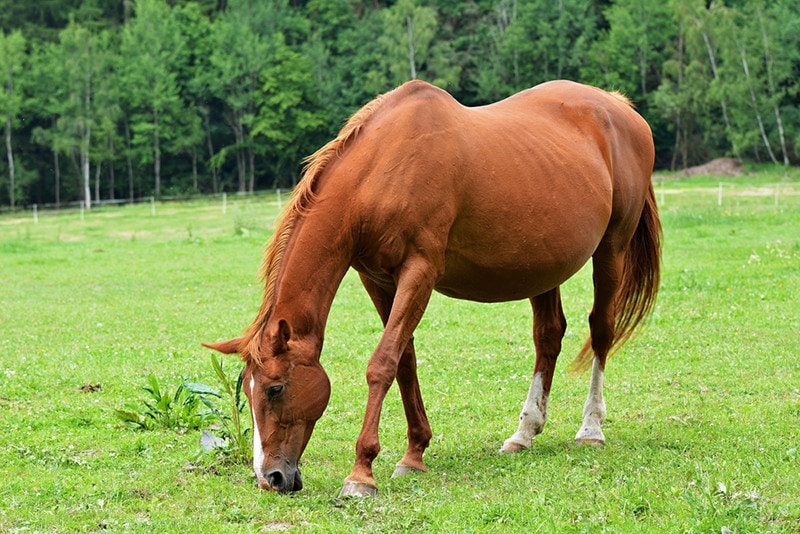
One of the oldest domesticated horse breeds, the Akhal Teke is a lithe, hot-blooded breed developed for endurance and speed. Originating in the desert of Turkmenistan, Akhal Teke horses were once used for raids.
Now, Akhal Tekes are kept for dressage, showjumping, endurance racing, and pleasure riding. Though they’re leaner and lighter than most of the breeds used for these disciplines, Akhal Tekes can be valuable in competitive environments, and due to their rarity, they may be considered a status symbol.
If you’re interested in bringing home an Akhal Teke, your average monthly cost will be $525–$3,350. Keep reading to learn what you can expect to pay to buy, feed, and care for your horse.
Bringing Home a New Akhal Teke: One-Time Costs
Akhal Tekes, like other horses, can be expensive in both upfront costs and ongoing costs. As a rare breed, Akhal Teke horses can be expensive, especially from reputable breeders with proven performance.

Free
In most cases, you won’t see a rare or threatened breed like the Akhal Teke offered for free. Horses are rarely free, other than in situations in which they are retired, unsuitable for work, and strictly kept as pasture companions—especially not with breeds that can command high prices as competition or breeding stock.
Adoption
Adopting a horse from a rescue or a rehabilitation program, as with racehorses, comes with an adoption fee. The fees vary, ranging from $500 to $5,000, depending on the type of rescue organization and the horse’s health and background.
That said, Akhal Teke horses and sub-breeds are rare and highly sought so they’re unlikely to end up in rescues.
Breeder
The Akhal Teke is one of the rarest horses in the world, but the prices can vary widely according to bloodlines, age, and training. Some sub-breeds and lines are in high demand, commanding higher prices.
The cheapest option for an Akhal Teke is a foal, which costs about $8,000. The price rises from there, with one- or two-year-olds priced between $13,000 and $28,000. A three-year-old costs between $20,000 and $39.000. A four- or five-year-old may cost between $13,000 and $135,000, depending on its training, competition record, and more.

Initial Setup and Supplies
After the cost of the horse, the initial costs depend on what you buy. At the minimum, your horse will need a halter and lead rope, sheets and blankets based on your climate, and grooming supplies. Feed and water buckets, wash buckets, first-aid supplies, and other staples are typically provided in boarding facilities, but if you keep your horse at home, you will need to get these yourself.
If you plan on riding or driving, you will also need tack for your horse and appropriate riding gear for yourself.
List of Akhal-Teke Care Supplies and Costs
| Halter and lead rope | $20–$300 |
| Feed and water buckets | $15–$30 |
| Turnout and fly sheets | $100–$250 |
| Light and heavy blankets | $250–$500 |
| First-aid supplies | $20–$50 |
| Saddle | $600–$2,000 |
| Bridle | $100–$2,000 |
| Grooming brushes | $5–$50 |
| Hoof pick | $2–$10 |
| Shampoo | $10–$20 |
| Wraps or boots | $10–$100 each |
How Much Does an Akhal Teke Cost Per Month?
Several factors impact your monthly cost to keep an Akhal Teke, including its health needs, whether you board or keep your horse on your own property, and whether you plan to take lessons or show.1

Health Care
The monthly costs for a horse’s health care vary widely based on the costs in your area for hay and grain, your horse’s general health and age, and any special needs it has. For example, competition horses that require special supplements, shoes, or additional insurance coverage will be more expensive than a retired pasture horse.
Food
Horses eat about 1–2% of their body weight in roughage each day, which is about 15 to 20 pounds of food per day. If pasture is available, that will take up some of the bulk of the roughage, but that comes with additional costs for seeding, maintenance, pasture rotation, fencing, and land costs like leasing or property taxes.
Both hay and grain costs can vary by type, location, and brand. Buying in bulk, particularly for hay, offers a lower per-unit cost and more cost-effective feeding.
Grooming
Unless you’re hiring a professional groom, the tasks for grooming will only take your time and the cost for supplies. Farriers are necessary to maintain your horse’s hooves, however, which can cost anywhere from $100 to $350 every 4–6 weeks. Some horses do well with just front shoes or barefoot, but if all four hooves need to be shod, or special shoes are needed, the price will go up.
Medications and Vet Visits
The costs of veterinary care don’t vary much from month to month, but they do from year to year. Horses get routine vaccinations and testing annually, including tetanus, rabies, West Nile, and Eastern and Western Equine Encephalitis, which cost about $150. There’s also a farm call, which ranges from $25 to $75, but that may be split between multiple owners if the vet is caring for several horses in the same visit.
Horse dental care is also needed annually, which includes teeth floating, a procedure that files the teeth to smooth rough edges. This can cost between $50 and $100, plus additional costs for root canals, extractions, sedation, or other procedures.
If horses need visits outside of the annual visit, that will also be another farm call and the cost of the exam, testing, and treatment. Depending on the nature of the injury or illness, this can run into thousands of dollars.
In addition, if your horse needs regular medications or supplements, that can add to the monthly veterinary costs.
Pet Insurance
Horse insurance differs from pet insurance in that it insures horses as an asset and income driver more than a companion animal.2 There are multiple coverage options, including mortality, major medical, accidental death or dismemberment, loss of use, and liability insurance.
The monthly premium also varies by the horse’s breed, age, purpose, and medical history, so it can be anywhere from $15 to over $100.

Environment Maintenance
Horses have a lot of upkeep in buildings, land, bedding, and supplies. Many people believe that keeping a horse at home will be less expensive, but there’s the cost for land, building or maintaining a barn, pasture maintenance, fencing, and more, which can cost thousands of dollars each year.
If you choose to keep your horse at a boarding facility, the costs vary by location, the type of facility, and its amenities. Retirement boarding facilities or partial board options may only be a few hundred dollars per month, but full-board at a high-end competition facility with amenities like indoor and outdoor arenas could cost thousands of dollars per month.
| Bedding | $200/month |
| Building and land maintenance | $1,000/month |
| Board | $100–2,000/month |
Entertainment
If you plan to ride and want to take lessons, it’s important to factor that into your budget. Lessons in a group are cheaper, usually around $50 to $65 each, but lack individual attention. If you want a private lesson, they run between $75 and $150 per hour, and you’ll want to take at least one lesson per week. Riding clinics or lessons with top trainers can cost hundreds of dollars each.
If you keep your horse at a boarding facility that provides instruction, it won’t cost you anything additional to take lessons with your horse. In fact, some facilities offer prorated lessons for full-board clients. Otherwise, you will need to pay for transportation to take your horse to lessons, either by purchasing your own truck and trailer or paying for local transportation. Either option can add hundreds of dollars to the costs each month.
Finally, if you plan to compete, show fees will need to be considered in your budget. Depending on the show, the fees can cost $25 per class or upwards of $150 per class (more for a full division with multiple classes). You also need to pay for transportation to the show and appropriate show gear for both you and your horse, which varies significantly.
Total Monthly Cost of Owning an Akhal Teke
The costs of owning an Akhal Teke depend on many factors. If you have a prized competition horse and plan to enter local shows and take lessons during the week at a full-board facility, that can significantly raise your costs. But even keeping your horse at a low-cost facility or home costs money for building and land maintenance, food, bedding, and veterinary care.
Additional Costs to Factor In
Even with the best routine care, horses are always at risk for injury or illness. Emergency farm calls are often higher than routine farm calls, especially in the evening or on weekends, and you’ll have additional costs for diagnostics and treatment.
If the horse’s condition is severe, you may need to transport your horse to a large-animal hospital, which is not only more expensive but requires transportation through a service or your own truck and trailer. Major medical care for a horse can cost thousands or tens of thousands, especially if hospitalization or surgery is involved, so it’s best to have insurance coverage or an emergency fund to prepare for the unexpected.
If you plan to board your horse, you won’t need to worry about the costs of maintaining or replacing anything related to your horse’s care, such as fencing or feed or water buckets. This is also more convenient if you need to go away, as the barn owner or manager will care for your horse as part of your board. If you keep your horse at home, these financial responsibilities fall on you.
Owning an Akhal Teke on a Budget
Horses are large animals, and their care is expensive. Unfortunately, many horses end up in rescues because owners weren’t prepared for the cost of ownership. There are ways you can reduce the expense of keeping a horse, however.
Saving Money on Akhal Teke Care
If you have your own property, it may be cheaper to keep a horse at home than at a boarding facility. There are also low-cost boarding facilities that offer partial boarding, which means you take on a lot of the work of caring for your horse, like feeding, turnout, and cleaning stalls. Some boarding facilities also offer deals if you’re willing to do some of the barn chores in exchange for reduced board or free lessons.
It’s also cheaper to keep a horse as a pasture horse or a pleasure horse rather than for competition. Performance horses have more expensive requirements all around, not to mention the cost of lessons, training, and show fees.
One of the unexpected expenses with horse ownership is major veterinary issues, which can run you into the thousands or tens of thousands of dollars. It’s important to have an emergency fund or horse insurance to prepare for these expenses.
Conclusion
Akhal Tekes are prized horses that excel in many equestrian sports. Due to their rarity, these horses are often obtained from breeders rather than rescue organizations, and they can be expensive to purchase. Otherwise, their care is similar to other horses, so you can expect to pay between $525 and $3,350 per month to own an Akhal Teke. The costs depend on many different factors, including your horse’s health, where you keep it, and what you use it for.
Featured Image Credit: Olga_i, Shutterstock











